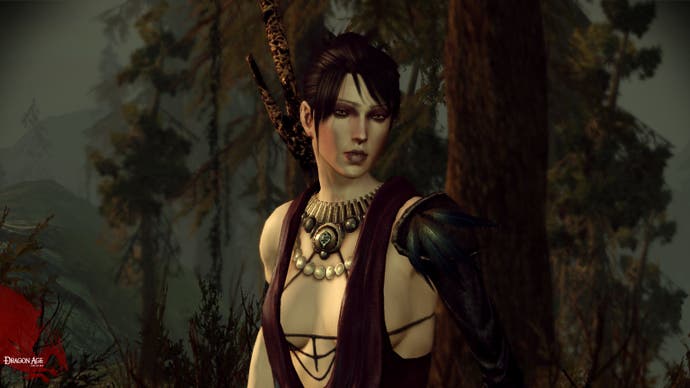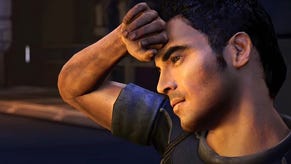Games of 2009: Dragon Age: Origins
Epic scale.
Dragon Age's most frequent theme is the line between acculturation and enculturation. You are constantly challenged by the cultural nature of the races you meet, and your own, and how they interact. But at this point the game becomes about inculturation. Can you support an individual who wishes to convert a race to his religion?
I decided my character would. Simon, a Human Warrior who had been helping the Chantry with the quests from their Chantry Boards perhaps with naivety, would want to support this man's right to religious expression. John, a Human Writer, would be far more likely to suspect him of being one of those shouting lunatics in the street, and erring on the side of cynicism recommend he not. But I was to feel badly as soon as I saw the first result of this Chantry, once it was established with Simon's support.
A young Dwarf, cast to the gutters for falling pregnant with a casteless man's son, had been abandoned by her family. Living on the street, her life was in danger and no one would support her. But for the Chantry, who gave her a home, food, and love. Surely this was good? (Of course it couldn't be this simple. It's also possible to find her father and convince him to accept her back into his family, with all the accompanying issues that raises.)
And then comes the end of the game. Once the game is over, and you've watched whatever conclusion your actions may have brought about, it cuts to a sequence of written messages that catch you up to various characters and companions you might have met throughout the game. I'm a sucker for those - those captions at the end of films or programmes. The greatest example of all being at the end of the last episode of Quantum Leap - that line about Sam makes me blub just to describe it. And they work well here.

I wasn't expecting one about Brother Burkel. The quest was so brief, so seemingly inconsequential to the larger story, that I'd forgotten about it, and fully expected the game to as well. But up popped that two-part message.
"Brother Burkel's new Chantry in Orzammar drew a surprising number of converts among the dwarves. They quickly attracted a great deal of anger from more conservative quarters, and before long the Assembly severely restricted the Andrastians' rights.
"Brother Burkel resisted, and was slain while being arrested during a peaceful demonstration in the Commons. The Assembly claimed this was an accident, but news of the resulting riots reached the Chantry on the surface, where the Divine even contemplated a new Exalted March."
An Exalted March is essentially a crusade. A bloody battle fought in the name of the Chant. My small action, and its escalating consequences, might have brought about the beginnings of a religious war.
I want to emphasise again, this was an ignorable side-quest of no significance to Dragon Age's main narrative. It changed the options available when choosing whether to look after the starving girl you meet, but beyond that, you could have walked past it and never known it was there.
This is the sort of depth on display in Dragon Age. This is why it is one of the most extraordinary gaming achievements I've seen. This is why I dismiss suggestions that the game succumbs to cliché. Yes, Elves and Dwarves and Mages and Humans fighting an ancient evil army that will destroy us all is hardly groundbreaking fantasy fiction. Creating a world you can live in, around which this vast war is occurring, is groundbreaking.
Check out the Editor's blog to find out more about our Games of 2009.








